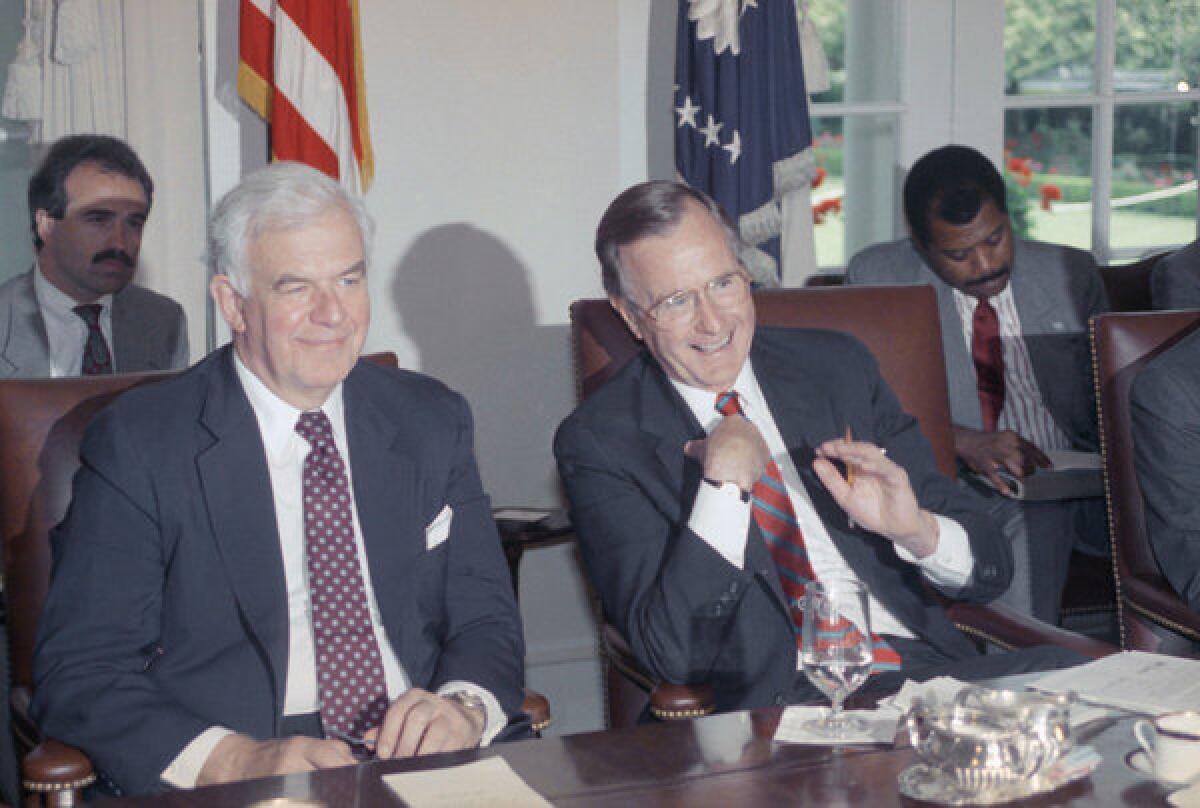Tom Foley, the last of the non-polarizing House speakers

- Share via
Former House Speaker Thomas S. Foley (D-Wash.), whose death was announced Friday, embodied everything that seems to have vanished from Washington. A consensus-builder, he was well mannered, reserved and modest, and he led the House like an institution, not a political rally. He was the antithesis both of the man he replaced, Jim Wright, a Texas Democrat who wielded power like a club, and the man who would succeed him, Newt Gingrich, a Georgia Republican whose ego and ambition were too grandiose even for the nation’s capital.
He was ousted by his constituents in the GOP midterm landslide of 1994, after having served 15 terms. But it wasn’t the GOP’s proposed “Contract With America” that undid Foley; it was his opposition to term limits. His Republican opponent, George Nethercutt, made the most of Foley’s successful court battle to overturn the term limits that state voters had approved in 1992. For his part, Nethercutt pledged to serve no more than six years in the House. He went on to serve 10.
Anyway, after Gingrich left Congress following Republicans’ steep losses in 1998, the GOP eventually settled on a speaker as approachable as Foley: Dennis Hastert of Illinois. But Hastert ushered in the informal “Hastert rule,” which he used to bar the House from considering anything that a majority of Republicans didn’t support. The current occupant of the chair, John A. Boehner (R-Ohio), has gone even further, rarely allowing votes on measures unless Republicans can provide all the votes needed to pass them. That’s equivalent to 90% of the House GOP.
Foley was a partisan, but not to that extreme. Nor was he the focal point for Republican resentment the way that Wright was and later Speaker Nancy Pelosi (D-San Francisco) became. Foley was also known as a problem-solver. One problem he encountered as speaker was his own burgeoning waistline, which led him to become something of a fitness fanatic.
Which leads me to the only Tom Foley anecdote I have from my seven years covering Congress in Washington, which just happened to correspond with his time as speaker. Late one night I ran into him in the bread aisle of a Safeway in Washington. This was unusual for a couple of reasons: Top legislators ate out rather than cooking for themselves, and they typically let their spouses run their household so they could spend more time working (and fundraising).
Foley, who was still in formal wear from some event that evening, was struggling to read the fine print on a loaf of raisin bread while his security guy stood watch behind him. I said something to the effect, “Mr. Speaker, there’s no point in reading the nutritional information. It’s raisin bread. There is no nutritional value.” And he replied with something along the lines of, “I’m just trying to find the least bad option.” His security guy shrugged, as if Foley routinely made late-night carbohydrate runs.
Our chat went no further. And not long after that, Foley was out of office. A few years later, President Clinton named him ambassador to Japan, a role well suited to his conciliatory style of governing. It’s hard to envision his successors in a job like that.
ALSO:
Tea party backlash: Protest signs to cheer you up
Follow Jon Healey on Twitter @jcahealey and Google+
More to Read
A cure for the common opinion
Get thought-provoking perspectives with our weekly newsletter.
You may occasionally receive promotional content from the Los Angeles Times.







